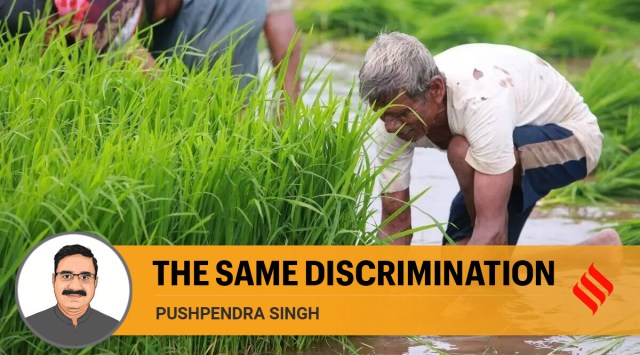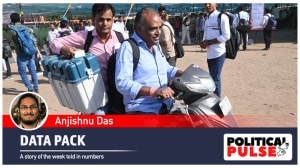- India
- International
State-level OBC groups must be included in central list
Pushpendra Singh writes: The SCs and STs are identified as such ‘with respect to any State or Union Territory’ and have only one list and one status at the state and central levels. So, why are the OBCs being identified differently?
 The issue of sub-categorisation arises from the perception that a few dominant castes among the OBCs have cornered a disproportionate amount of the benefits emanating from the reservation. (Representational)
The issue of sub-categorisation arises from the perception that a few dominant castes among the OBCs have cornered a disproportionate amount of the benefits emanating from the reservation. (Representational)The Other Backward Classes or OBCs largely come from farming and other “middle level” communities in India. The Justice Rohini Commission, ostensibly set up to ensure equitable distribution of reservation benefits among the OBC castes through sub-categorisation, was given yet another extension (10th in five years) last month. However, the political aim behind this endeavour is likely the desire of the current ruling dispensation to divide the OBC block, which constitutes over 50 per cent of the country’s population.
The issue of sub-categorisation arises from the perception that a few dominant castes among the OBCs have cornered a disproportionate amount of the benefits emanating from the reservation. The truth of the matter cannot be ascertained until a caste census is conducted.
A far more pressing matter than the sub-categorisation of OBCs is a glaring, prevalent injustice. Currently, for each state, there are two OBC lists — from the state and the Centre. So, a caste may be included in the OBC list of a state and enjoy the reservation benefits in state government jobs and educational institutions but not with respect to central government jobs or educational institutions. Across all the states, there are hundreds of such OBC castes whose members are being denied reservation benefits in central government jobs. How did this happen? And what is the remedy?
Articles 15(4) and 16(4) of the Constitution make special provisions for socially and educationally backward classes of citizens (SEBCs, popularly known as OBCs), the Scheduled Castes (SCs) and Scheduled Tribes (STs). So, provisions available to SCs and STs should have been extended to OBCs. In 1955, the first Backward Classes Commission identified and listed 2,399 castes as OBCs and recommended various welfare measures for the same. But, the then central government took the strange decision not to implement the recommendations of the Commission. It said, instead, that no all-India lists of backward classes should be drawn up nor any reservation be made for any group of backward classes in central government jobs.
Ignoring the recommendations of the Commission proved to be detrimental to the uplift of more than 50 per cent of the population. The Centre suggested that state governments may draw up their own lists. This was a body blow to the castes in the category. Due to the much-delayed introduction of OBC reservations in the 1990s, those from OBC castes have an abysmal representation in central government jobs — just about one-third of their proportion in the general population. As a counterfactual, the SCs and STs — who have had the benefit of reservations right from Independence — have a much more robust representation in central jobs.

The second Backward Classes Commission known as the Mandal Commission, gave its report in 1980. This report leaned heavily on various state OBC lists to draw its list. But, unfortunately, once again nothing was done about the recommendations by the central governments for almost a decade. Finally, the V P Singh government decided to implement the recommendations. On the issue of inclusion of various castes in the central OBC lists, Singh said in Parliament: “While in the first phase, we are taking that which is common, those castes and minorities which are common to both the State Lists and the Mandal Commission List, in the next phase we will be interacting with the States and identifying ‘socially and educationally backward’ and in that sense, with this interaction we can make further progress regarding this.”
The central government introduced a reservation of 27 per cent for OBCs in government jobs on August 13, 1990. The issue went to the Supreme Court. Pursuant to its judgment in what came to be known as the Indira Sawhney case, the National Commission for Backward Classes Act, 1993 was enacted and the central government reemphasised: “The OBCs for the purpose of the aforesaid reservation would comprise, in the first phase, the castes and communities which are common to both the lists in the report of the Mandal Commission and the State Governments’ Lists.”
It is thus clear that a class deemed as belonging to the OBC category by a state is a sufficient reason for the central government to include it in the Central OBC list for that state. In the Supreme Court, during the hearing of the Jat reservation case (Ram Singh and Ors vs Union of India), the Attorney General of India argued that the inclusion of classes or groups in state OBC lists is a strong and compelling reason for the inclusion of such classes in the central lists because in our constitutional scheme, the Union and state governments need to work in tandem and not at cross purposes. The Supreme Court judgment validated this argument.
The SCs and STs are identified as such “with respect to any State or Union Territory” and have only one list and one status at the state and central levels. So, why are the OBCs being identified differently? We all know that the most powerful jobs — IAS, IPS, IFS, IRS — are under the Centre and so are coveted educational institutions like the IITs, IIMs, AIIMS and central universities. The “two-status” castes are being denied reservations in all these important avenues.
Before the government thinks of any sub-categorisation among the OBCs, it should give proportional representation to the OBCs after conducting an extensive caste census. But it must first end the discriminatory non-inclusion of hundreds of state-level OBC groups in the central OBC list.
(The writer is president, Kisan Shakti Sangh)
EXPRESS OPINION
More Explained
Apr 25: Latest News
- 01
- 02
- 03
- 04
- 05











































